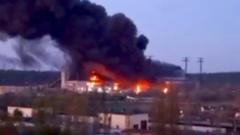By Sir Ronald Sanders
On April 10, the Permanent Council of the Organization of American States (OAS) passed a resolution firmly denouncing the government of Ecuador for authorising an intrusion of the Mexican Embassy in Quito by Ecuadorian police and for the use of force against diplomatic staff.
The resolution arose because, on the evening of April 5, the Ecuadorian police intruded into the Embassy to arrest a former Vice President of Ecuador, Jorge Glas, who had sought refuge in the Mexican Embassy and had been granted political asylum by the government of Mexico just hours before the raid. The police action against Glas was brutal.
Tension, between the governments of Mexico and Ecuador which already existed, escalated the day before the violation of the Mexican Embassy when the Mexican President, Andrés Manuel López Obrador, made a statement implying that the election of Ecuadorian President Daniel Noboa was influenced by the assassination of a presidential candidate, Fernando Villavicencio. President López Obrador suggested that the murder created a “rarefied atmosphere of violence” and affected the election outcome.
The Mexican President’s remarks were described publicly by the Ecuadorian government as “very unfortunate”, but subsequent events demonstrated that President Noboa resented the remarks more deeply. He promptly ordered that the Mexican Ambassador be declared “persona non grata” on April 4, the day before the police raid on the Mexican Embassy.
All of this was fuel for a conflict between the two governments that was already in play. The Mexican Embassy in Quito had given Jorge Glas refuge since 17 December 2023 on the basis of his claim that criminal charges against him were acts of political persecution by the Noboa government. Prior to the police violation of the Mexican Embassy, Ecuadorian authorities had sought permission from Mexico to enter the embassy and arrest Glas, who had been sentenced to six years in prison in 2017 after being found guilty of receiving bribes from the Brazilian construction firm, Odebrecht, in exchange for awarding it government contracts. However, Mexico did not agree.
It was in the height of these difficulties that the Ecuadorian police intruded into the Mexican Embassy to seize Glas in contravention of Article 22 of the Vienna Convention on Diplomatic Relations, which underlines the sacrosanct nature of diplomatic premises and mandates the host country to protect them from any intrusion or violation.
This contravention alarmed the overwhelming majority of member states of the Organization of American States (OAS), which rightfully regard the rights and immunities granted to diplomatic missions not as a mere legal formality, but as the bedrock of peaceful and respectful international relations. By invading the Mexican Embassy, the Ecuadorian government eroded the role of essential communication that embassies represent and the critical work of diplomatic personnel in fostering constructive relationships with host governments.
Therefore, whatever concerns the Ecuadorian government had about Mexico granting Glas political asylum, invading the Embassy, violently seizing and beating him and manhandling Embassy officials, cast the government of Ecuador squarely in the wrong.
This was not a matter other governments could overlook. It had to be condemned in order to send a strong message to the Ecuadorian government and all governments that such violations of international law are unacceptable.
Hence, on April 10, after consultations between member states, 29 of the 32 active OAS member states voted in favour of the Resolution which condemned Ecuador’s action. Only Ecuador opposed, and only one country, El Salvador abstained.
Mexico was absent from the meeting, likely due to the presence at the meeting of a Vice Minister from Ecuador with which Mexico had severed diplomatic ties immediately following the assault on its Embassy.
Having rightly condemned the government of Ecuador for intruding into the Mexican Embassy, thereby violating international law and eroding a pivotal cornerstone of peaceful international relations, a continuing dispute between Mexico and Ecuador has repercussions which must be avoided in the interest of the two countries and the broader hemisphere.
The ongoing dispute between Mexico and Ecuador risks disrupting unanimity within the OAS’s Group of 10 and could extend its divisive effects to the Latin American and Caribbean group (GRULAC) at the United Nations, potentially hampering consensus on important issues. Recognizing the critical need for resolution, the OAS resolution encourages dialogue, with the Permanent Council offering its support to mediate efforts towards reconciliation.
Navigating such a path may be difficult in the present circumstances where both Mexico and Ecuador feel aggrieved with each other. Indeed, on April 11, the Mexican government filed an Application instituting proceedings against Ecuador before the International Court of Justice (ICJ), contending that “Ecuador has violated Mexico’s rights under customary and conventional international law, as well as fundamental principles upon which the international legal system is based”. Mexico has asked the court to indicate provisional measures pending a final judgment in the case, including that “Ecuador refrains from any act or conduct likely to aggravate or widen the dispute”.
In its full hearing of the case, the ICJ, the Court may have to assess the merits of a counter claim from Ecuador, which has publicly stated that the Mexican asylum offer to Jorge Glas was wrongful under international law because individuals facing criminal charges should not be granted asylum.
The Ecuadorian government bases this contention on Article III of the 1954 Caracas Convention on Diplomatic Asylum which is legally binding only on 14 States that have ratified it – 13 from Latin America and one (Haiti) from CARICOM.
However, the 1954 Convention may have been superseded by the Convention on Diplomatic Relations which came into effect in April 1964 and to which 193 states are signatories, including Ecuador and Mexico. Additionally, Article IV of the 1954 Convention also states, “It shall rest with the State granting asylum to determine the nature of the offense or the motives for the persecution”.
It will be for the ICJ to decide whose legal arguments concerning granting asylum is right, but what cannot possibly be justified is the invasion of an Embassy. On that, Ecuador will undoubtedly be rebuked.
Notwithstanding these circumstances Mexico and Ecuador, in their own interest, should try to overcome this problem which, while framed in legal terms and now before the ICJ, has strong political overtones.
The post Embassy raid sparks outcry: Urgent healing action needed appeared first on Caribbean News Global.

